A sharp memory and clear focus are vital for daily life, yet many people notice their mental clarity decline with age or stress. While no herb can replace medical care, research suggests that certain natural remedies may help protect the brain, improve concentration, and slow age-related memory loss. For centuries, herbs like turmeric, sage, and ginkgo have been used in traditional medicine to nourish the mind, and modern science is beginning to confirm their benefits. Adding these herbs to your meals, or using them carefully as supplements, may offer gentle, natural support for better brain health.
Effective herbs for memory and brain health
Gotu Kola
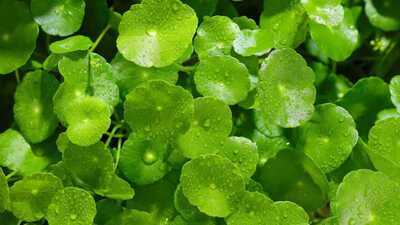
Gotu kola is a staple in both Ayurveda and Chinese medicine, often referred to as the “herb of longevity.” Traditionally used to enhance mental clarity and focus, modern research suggests it may also protect the brain from oxidative stress and age-related decline. Animal studies indicate that gotu kola may reduce inflammation in the brain and improve memory function.
A study in Frontiers in Pharmacology suggested that gotu kola could play a role in reducing Alzheimer’s-related damage and supporting overall cognition. It is commonly consumed as a tea or supplement, but rare cases of liver damage have been reported, so it should be used responsibly.
Lemon Balm
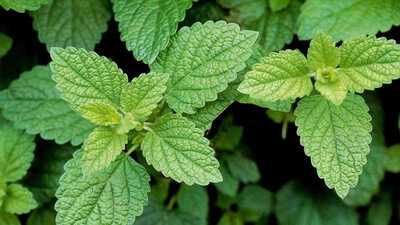
Lemon balm is a soothing herb often taken as tea to ease stress, anxiety, and insomnia. Interestingly, it also appears to have cognitive benefits. Its active compound, rosmarinic acid, has antioxidant and anti-inflammatory effects that may protect brain cells. Research has found that lemon balm extract may help prevent cognitive decline in older adults, particularly those at risk of memory impairment.
A study published in Sage Journals reported that 500 mg of lemon balm extract daily could help reduce memory decline without significant side effects. Beyond supplements, drinking lemon balm tea is a simple and relaxing way to support brain health.
Turmeric
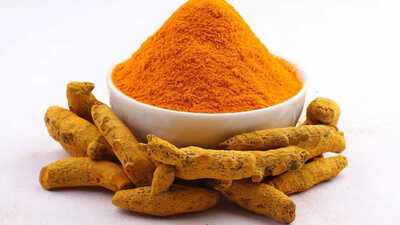
Turmeric, a golden spice widely used in Indian cooking and Ayurveda, has gained attention worldwide for its brain-protective qualities. Its active compound, curcumin, has both antioxidant and anti-inflammatory properties, making it beneficial for overall brain health. Research suggests that turmeric may help clear beta-amyloid proteins from the brain—these are the same proteins that form plaques associated with Alzheimer’s disease.
Turmeric may also help protect nerve cells from damage and slow cognitive decline. To get the most benefit, include turmeric in curries, soups, or smoothies, and pair it with a pinch of black pepper. Piperine, a compound in pepper, boosts the absorption of curcumin significantly, making the spice even more effective.
Ginkgo Biloba

One of the most studied herbs for brain health, ginkgo biloba has been used in traditional Chinese medicine for centuries. It is believed to improve blood flow to the brain, which may enhance memory and concentration. Some research has found that ginkgo supplements can benefit people with Alzheimer’s disease or mild cognitive impairment.
A 2021 study published in NIH highlighted that a ginkgo extract called EGb761 may help slow cognitive decline, particularly in patients who experience mood and behavioural symptoms alongside memory loss. While results across studies are mixed, many people continue to use ginkgo as a natural memory aid. Still, it should be taken with caution, especially for those on blood-thinning medication, as it may increase bleeding risk.
Ashwagandha
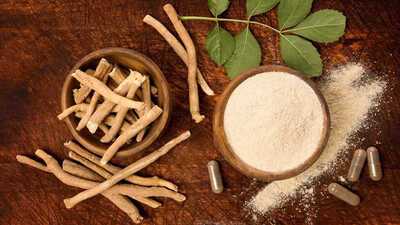
Ashwagandha, another powerful herb from Ayurveda, is traditionally used as an adaptogen—helping the body cope with stress. Modern research shows that it may also support brain health by reducing oxidative stress, a factor linked to Alzheimer’s disease and other forms of cognitive decline. Ashwagandha is thought to inhibit the formation of beta-amyloid plaques in the brain, which play a key role in neurodegeneration.
Many people use ashwagandha to improve memory, reduce anxiety, and promote better sleep—all of which indirectly support sharper cognition. It is commonly available as a powder, capsule, or tea, though it should always be taken under professional guidance, especially if you have underlying health conditions.
Sage

Sage is more than just a fragrant kitchen herb; it has long been valued for its memory-boosting properties. Known for its pungent aroma, sage contains active compounds that may support cognitive and neurological function. Its natural compounds may protect brain cells and improve communication between nerve cells, which is crucial for learning and recall.
You can easily add sage to roasted vegetables, poultry, soups, or even enjoy it in tea form. However, sage supplements should be used with caution, as very high doses have been linked to adverse effects in children and adults.
Ginseng
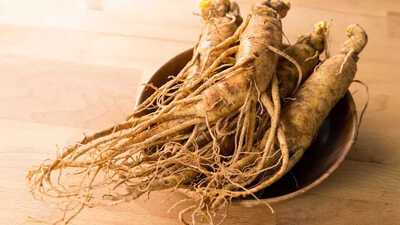
Ginseng is one of the most popular herbs in traditional medicine, prized for its ability to boost energy, immunity, and brain power. Its active compounds, ginsenosides, have anti-inflammatory properties that may protect brain cells from damage. Preliminary studies suggest that ginseng may help lower levels of beta-amyloid in the brain, potentially slowing age-related memory decline.
While some studies support its role in improving mental function, the effects of ginseng can vary from person to person. It can also interact with medications and affect blood pressure, so it’s best used carefully and under medical supervision.
Should you use herbs for memory and brain health?
While these herbs show promise, they should not replace standard medical care for conditions like Alzheimer’s disease or dementia. Cooking with herbs such as turmeric, sage, or lemon balm is safe and beneficial, but concentrated supplements carry risks, including liver damage, allergic reactions, and drug interactions. Many supplements are also unregulated, raising concerns about purity and contamination.
The safest approach is to enjoy these herbs as part of a balanced diet while speaking to your doctor before trying concentrated extracts or supplements. Combined with healthy lifestyle habits like exercise, sleep, and a nutrient-rich diet, these herbs can be a natural way to support memory and protect your brain.
Also Read: Oat milk side effects: 7 health drawbacks of daily consumption
Effective herbs for memory and brain health
Gotu Kola
Gotu kola is a staple in both Ayurveda and Chinese medicine, often referred to as the “herb of longevity.” Traditionally used to enhance mental clarity and focus, modern research suggests it may also protect the brain from oxidative stress and age-related decline. Animal studies indicate that gotu kola may reduce inflammation in the brain and improve memory function.
A study in Frontiers in Pharmacology suggested that gotu kola could play a role in reducing Alzheimer’s-related damage and supporting overall cognition. It is commonly consumed as a tea or supplement, but rare cases of liver damage have been reported, so it should be used responsibly.
Lemon Balm
Lemon balm is a soothing herb often taken as tea to ease stress, anxiety, and insomnia. Interestingly, it also appears to have cognitive benefits. Its active compound, rosmarinic acid, has antioxidant and anti-inflammatory effects that may protect brain cells. Research has found that lemon balm extract may help prevent cognitive decline in older adults, particularly those at risk of memory impairment.
A study published in Sage Journals reported that 500 mg of lemon balm extract daily could help reduce memory decline without significant side effects. Beyond supplements, drinking lemon balm tea is a simple and relaxing way to support brain health.
Turmeric
Turmeric, a golden spice widely used in Indian cooking and Ayurveda, has gained attention worldwide for its brain-protective qualities. Its active compound, curcumin, has both antioxidant and anti-inflammatory properties, making it beneficial for overall brain health. Research suggests that turmeric may help clear beta-amyloid proteins from the brain—these are the same proteins that form plaques associated with Alzheimer’s disease.
Turmeric may also help protect nerve cells from damage and slow cognitive decline. To get the most benefit, include turmeric in curries, soups, or smoothies, and pair it with a pinch of black pepper. Piperine, a compound in pepper, boosts the absorption of curcumin significantly, making the spice even more effective.
Ginkgo Biloba

One of the most studied herbs for brain health, ginkgo biloba has been used in traditional Chinese medicine for centuries. It is believed to improve blood flow to the brain, which may enhance memory and concentration. Some research has found that ginkgo supplements can benefit people with Alzheimer’s disease or mild cognitive impairment.
A 2021 study published in NIH highlighted that a ginkgo extract called EGb761 may help slow cognitive decline, particularly in patients who experience mood and behavioural symptoms alongside memory loss. While results across studies are mixed, many people continue to use ginkgo as a natural memory aid. Still, it should be taken with caution, especially for those on blood-thinning medication, as it may increase bleeding risk.
Ashwagandha
Ashwagandha, another powerful herb from Ayurveda, is traditionally used as an adaptogen—helping the body cope with stress. Modern research shows that it may also support brain health by reducing oxidative stress, a factor linked to Alzheimer’s disease and other forms of cognitive decline. Ashwagandha is thought to inhibit the formation of beta-amyloid plaques in the brain, which play a key role in neurodegeneration.
Many people use ashwagandha to improve memory, reduce anxiety, and promote better sleep—all of which indirectly support sharper cognition. It is commonly available as a powder, capsule, or tea, though it should always be taken under professional guidance, especially if you have underlying health conditions.
Sage

Sage is more than just a fragrant kitchen herb; it has long been valued for its memory-boosting properties. Known for its pungent aroma, sage contains active compounds that may support cognitive and neurological function. Its natural compounds may protect brain cells and improve communication between nerve cells, which is crucial for learning and recall.
You can easily add sage to roasted vegetables, poultry, soups, or even enjoy it in tea form. However, sage supplements should be used with caution, as very high doses have been linked to adverse effects in children and adults.
Ginseng
Ginseng is one of the most popular herbs in traditional medicine, prized for its ability to boost energy, immunity, and brain power. Its active compounds, ginsenosides, have anti-inflammatory properties that may protect brain cells from damage. Preliminary studies suggest that ginseng may help lower levels of beta-amyloid in the brain, potentially slowing age-related memory decline.
While some studies support its role in improving mental function, the effects of ginseng can vary from person to person. It can also interact with medications and affect blood pressure, so it’s best used carefully and under medical supervision.
Should you use herbs for memory and brain health?
While these herbs show promise, they should not replace standard medical care for conditions like Alzheimer’s disease or dementia. Cooking with herbs such as turmeric, sage, or lemon balm is safe and beneficial, but concentrated supplements carry risks, including liver damage, allergic reactions, and drug interactions. Many supplements are also unregulated, raising concerns about purity and contamination.
The safest approach is to enjoy these herbs as part of a balanced diet while speaking to your doctor before trying concentrated extracts or supplements. Combined with healthy lifestyle habits like exercise, sleep, and a nutrient-rich diet, these herbs can be a natural way to support memory and protect your brain.
Also Read: Oat milk side effects: 7 health drawbacks of daily consumption
You may also like

The New Jews? Why hatred against Indians is exploding across the world

'Results of last LS polls manipulated': Rahul Gandhi in Bihar rally; doubles down on 'vote chori' charge against BJP, EC

China's global propaganda efforts 'warfare without bullets': Report

CPEC 2.0: Post India dialogue, China pushes for economic corridor with Pakistan, Afghanistan

Grey's Anatomy creator reveals one scene bosses forced her to reshoot






